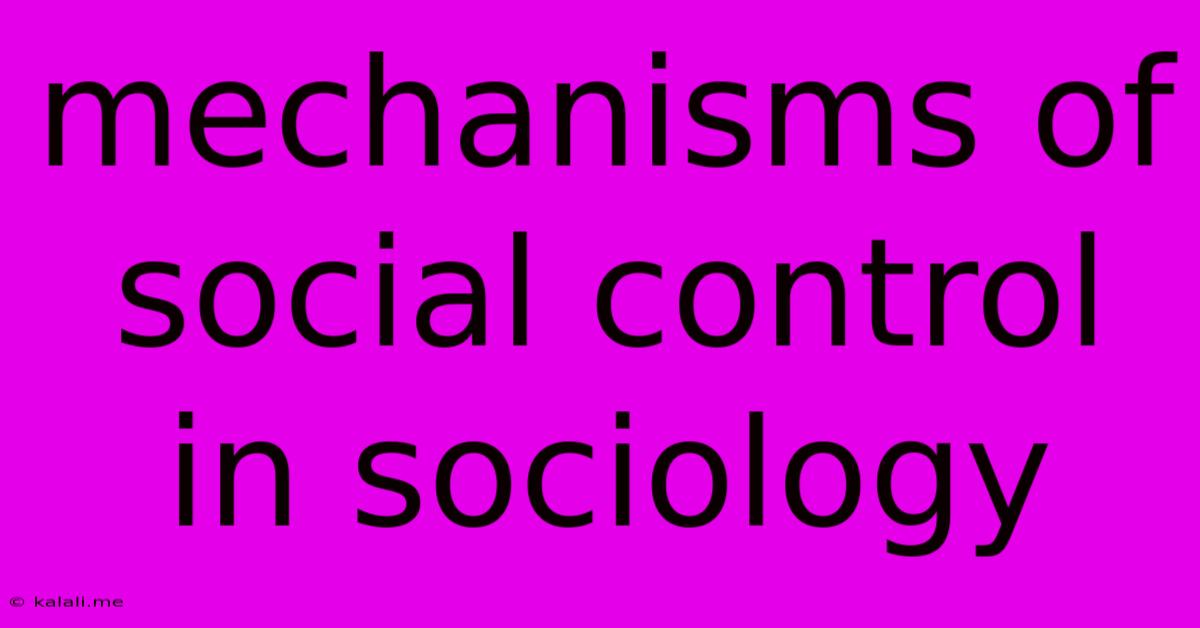Mechanisms Of Social Control In Sociology
Kalali
Jun 15, 2025 · 3 min read

Table of Contents
Mechanisms of Social Control in Sociology: Maintaining Order in Society
Meta Description: Explore the fascinating world of social control mechanisms in sociology. This article delves into the various ways societies maintain order, from informal sanctions like gossip to formal institutions like the law. Learn about the interplay between conformity, deviance, and the forces that shape our behavior.
Social control, a core concept in sociology, refers to the methods used by a society to regulate individual and group behavior, promoting conformity to established norms and laws. It’s the invisible hand that guides our actions, ensuring social order and stability. Without effective mechanisms of social control, societies would descend into chaos. This article examines the diverse mechanisms employed, ranging from subtle informal influences to powerful formal institutions.
Informal Mechanisms of Social Control
These are the everyday, often unconscious ways we regulate each other’s behavior. They are less codified and less punitive than formal mechanisms but are incredibly effective in shaping our actions. Examples include:
- Socialization: The process of learning and internalizing societal norms and values. From a young age, we are taught what is considered acceptable and unacceptable behavior, influencing our choices throughout life. This includes family, education, and peer groups.
- Gossip and Reputation: The power of social judgment is significant. The fear of negative reputation or social ostracism can be a powerful motivator for conformity. Gossip acts as a form of informal sanction, quickly disseminating information about deviant behavior and influencing social standing.
- Folkways and Mores: These are unwritten rules that govern everyday interactions. Folkways are customs and traditions, like saying "please" and "thank you," while mores are stronger norms carrying moral significance, such as prohibitions against theft or adultery. Violation of mores can lead to significant social disapproval.
- Peer Pressure: The influence of our peers is particularly strong during adolescence and young adulthood. The desire for acceptance and belonging can lead individuals to conform to group norms, even if they contradict personal values.
Formal Mechanisms of Social Control
These mechanisms are more structured and codified, often involving institutions and legal frameworks. They are typically reserved for more serious violations of societal norms. Examples include:
- The Law and Criminal Justice System: This is the most formal and powerful mechanism of social control. Laws define acceptable behavior, and the criminal justice system, encompassing police, courts, and prisons, enforces these laws. Punishments for violating laws range from fines to imprisonment.
- Government Regulations: Beyond criminal law, governments create and enforce regulations governing various aspects of life, including business practices, environmental protection, and public health. These regulations aim to ensure safety and order, and non-compliance can lead to fines or other penalties.
- Professional Codes of Conduct: Many professions have established codes of conduct that members are expected to uphold. These codes outline ethical standards and professional responsibilities, and violations can lead to disciplinary action, such as suspension or expulsion from the profession.
- Religious Institutions: Religion plays a significant role in shaping moral values and behavior. Religious institutions often exert social control through moral teachings, rituals, and sanctions for violating religious norms.
The Interplay of Conformity and Deviance
Social control mechanisms aim to promote conformity, but deviance – the violation of established norms – is inevitable in any society. The study of deviance helps us understand the limits of social control and the dynamics of social change. Understanding the reasons behind deviance – whether it be due to social inequality, psychological factors, or simply a rejection of existing norms – is crucial to developing effective strategies for social control. Furthermore, what is considered deviant can vary across cultures and time periods, highlighting the relative nature of social norms.
Conclusion
Social control is a multifaceted process involving a complex interplay of formal and informal mechanisms. These mechanisms are essential for maintaining social order and stability, shaping individual behavior, and promoting social cohesion. However, the effectiveness of social control is constantly challenged by deviance, prompting ongoing discussions about the balance between order and freedom, and the potential for social change. Further research into the effectiveness of different control mechanisms and their impact on various social groups remains a vital area of sociological inquiry.
Latest Posts
Latest Posts
-
Find The Total Power Developed In The Circuit
Jun 15, 2025
-
Which Of The Following Is Weak Electrolyte
Jun 15, 2025
-
Hudson Valley Community College Acceptance Rate
Jun 15, 2025
-
The Velocity Field Of A Flow Is Given By
Jun 15, 2025
-
Least Common Multiple Of 14 And 42
Jun 15, 2025
Related Post
Thank you for visiting our website which covers about Mechanisms Of Social Control In Sociology . We hope the information provided has been useful to you. Feel free to contact us if you have any questions or need further assistance. See you next time and don't miss to bookmark.